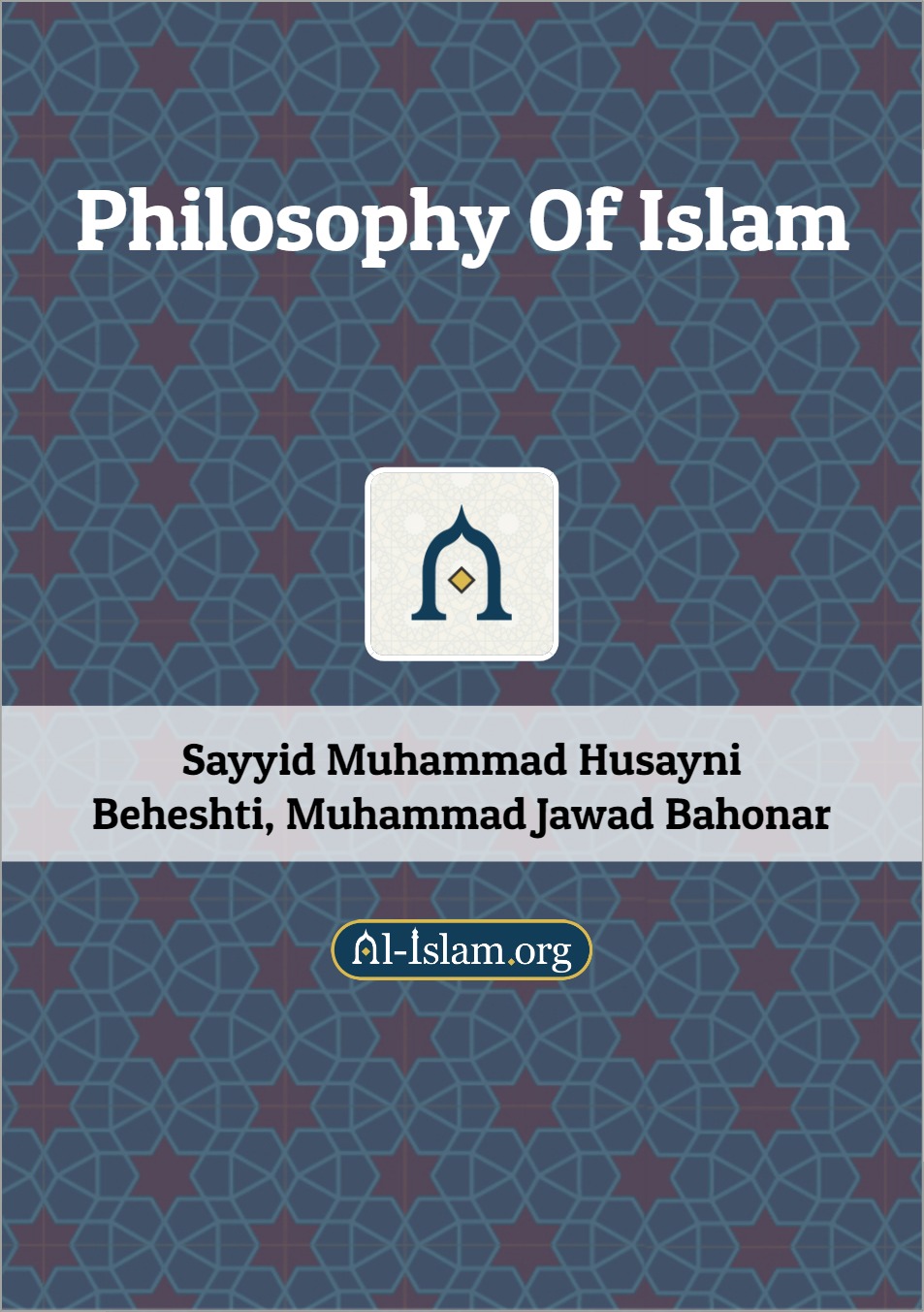
Fundamental Islamic topics such as principles of religion, man, Iman (faith), definitive knowledge, monothesim of the Qur'an, name and attributes of God, guides of humanity, evolution, history, self-making, family, economy and social system.
- Philosophy Of Islam
- Man of Our Age
- Iman
- Deep and Definite Knowledge
- The Sources of Creation
- 1. The world is a reality
- 2. The world is well‑organized
- 3. `To become' and its cause
- 4. Cause of systematic development and changes
- 5. Not an accident
- 6. Is contradiction the cause of `becoming'?
- Contradiction or attraction and cohesion
- The World is a Dependent Reality
- Signs of Allah
- Special signs
- Every thing at every stage is His sign
- Is ever‑changing world purposive?
- Monotheism of the Qur’an
- Refutation of polytheism
- The causes and the agents
- The miracles
- Superstitions not to be confused with causes
- Supplication
- Unity in Regards to Worship
- Unity in regard to submission and obedience
- Submission to the command of Allah
- The Unique and Matchless God
- Intrinsic Unity
- Evaluation of extremist view
- Names and Attributes of Allah
- Role of Divine Cosmology in Human Life
- Guides of Humanity
- Islam Advocates Justice
- Man and Evolution
- Man
- Appearance of New Humanism
- Man from the Qur'anic point of view
- Range of Man’s Choice and Will
- (1) Innate nature of man and his disposition
- (2) Modification of Propensities
- (3) Role of natural and geographical environment
- (4) Role of historical, social and economic factors
- (5) Role of the rules and regulations in the field of choice
- (6) Divine revelation
- (7) Man's own deeds make his destiny
- (8) Aim of Man's efforts
- Man from the View Point of Existentialism
- Man from the View Point of Islam
- View Point of Dialectical Materialism
- Islam's approach to these questions
- Islamic Conception of History
- The Qur'an pays attention to the usual course of history
- Violent outburst of desires and emotions
- Question of contradiction
- Great Role of the Prophets in Making History
- Revelation was the motive force of the Prophetic Movements
- Islamic Movement – A Manifestation of the Rules of History
- Guidance of the masses
- Element of Jihad
- Universality of the movement
- Leadership
- Three principles of the effectiveness of historic movements
- Human beings as the agents of Divine retribution
- Respect of the culture and human values of others
- Corruption of leadership
- Internal resistance
- Invaders influenced
- Final triumph of truth
- Final Victory
- Advent of the Mahdi
- At the threshold of appearance
- Revolutionary leader and his supporters
- Undergoing hardships for achieving success
- Complete equality will be enforced.
- Self Making
- Cleanliness
- Food
- Spiritual Health
- The real criteria of morals
- Improper Traits of Character
- 1. Hypocrisy
- 2. Arrogance
- 3. Slander
- 4. Lying
- 5. Backbiting and calumny
- 6. Jealousy
- Combating against jealousy
- How to Purge Soul of these Pollutions
- Creative Role of Sentiments
- Being good to kindred
- Love for neighbors
- Spiritual brotherhood
- Companionship
- Choosing friends and companions
- Cheerfulness and politeness
- Abiding by rules of social behavior
- Reception and farewell
- Humility
- Correspondence
- Respect for Elders and Kindness to Youngsters
- Hospitality
- Self Making for Social Work
- Major Jihad
- Family
- Family
- Tribe
- Clan
- Nation
- Other social groupings
- Dogmatic and ideological society
- Marriage
- Importance of marriage from Islamic point of view
- Basic object of marriage
- Freedom in choosing husband or wife:
- Consent of father to the marriage of a girl
- Equality or general fitness for matrimonial alliance
- Criteria of selection of a spouse:
- How to select a suitable spouse
- Persons between whom marriage is forbidden
- Consaguineous mahrams
- Foster‑mahrams
- Mahrams on account of affinity
- Contracting marriage
- Financial independence of woman
- Lightness of dower
- Obligations of husband and wife
- Financial responsibility
- Maintenance of Children and the Responsibility of Guardianship
- Moral and human responsibilities
- Divorce or Dissolution of Marriage
- Fixed Time Marriage
- Polygamy
- Family Manners
- Guidelines of Islamic Economy
- (1) Economics
- (2) Importance of Economic problems
- Ownership
- Wealth
- Right of property in Islam
- Natural Sources of Wealth
- Ownership of land
- Economic Role of Human Labour
- Transfer of Ownership
- Distribution of Wealth
- Zakat
- Just Social System
- Society
- Accidental society
- Intentional society
- Characteristics of Accidental Society
- Characteristics of Intentional Society
- Individual and society
- It is the individual who is important
- It is the society which is important
- It is the mixture of the individual and the society which is important
- Social System
- Just Social System
- Equality of men
- Legal Justice
- Elimination of undue discrimination under Islamic conception
- Economic Justice
- Freedom of thinking and acquirement of knowledge
- Profit is the result of work and all‑round activity
- Privation is the result of encroachment
- Law of justice and a just mechanism to enforce it
- Sense of responsibility
- Islamic brotherhood
- Character building and fighting against corruption
- Essential Elements for the Establishment of a Just Social System
- Law and Its Sources in Islam
- Sources of Cannon Law
- Guarantee of the Enforcement of Law
- Government
- Role of Shura and Bay’at
- Caliphate and Imamate
- Doctrines of Justice and Imamate
- Arbitration
- Relations of the Muslims with Others
- Jihad
- Peace in Islam
